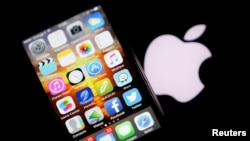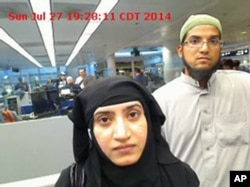A U.S. newspaper is reporting that federal investigators paid professional hackers to help them crack into the Apple iPhone used by one of the terrorists who killed 14 people last December in San Bernardino, California.
The Washington Post said Wednesday that the Federal Bureau of Investigation paid a one-time flat fee to the hackers who provided the U.S. law enforcement agency with information about a previously unknown software flaw in the cellphone.
The newspaper said that information allowed the FBI to crack the phone's four-digit personal identification number without setting off a security feature that would have erased all the phone's data. The challenge for investigators had been to disable that security because it would have wiped data stored on the device after 10 incorrect guesses on the code.
Results not revealed
It is not known what the FBI found on the phone used by Syed Rizwan Farook, an American-born Muslim, who carried out the assault on a local government center with his Pakistani-born wife, Tashfeen Malik, before being gunned down hours later in a massive shootout with police.
It is also not known whether the FBI will now disclose the security flaw to Apple so the U.S. technology can patch it.
FBI investigators have concluded that Farook and Malik were "homegrown violent extremists," radicalized over a several-year period and inspired by overseas terrorist groups, but not part of a terrorist cell. They met in the Middle East and Malik gained legal entry into the United States on a "fiancee visa," a promise to marry Farook shortly after she arrived in the United States, which she did.
Legal dispute
Before the FBI hired the hackers, its pursuit of information on the phone became a contentious legal fight with Apple. The government filed suit against Apple to help it crack into Farook's iPhone, but the company, supported by other technology firms, refused to help, on the grounds that it would violate the security and privacy of millions of iPhone users.
The legal dispute ended late last month when the government announced it had managed to break into the phone with the help of an undisclosed third party, which turned out to be the hackers.
FBI Director James Comey told a law school audience in Washington on Tuesday that he was glad the court fight was averted. He said the clash of concerns over privacy and national security "was creating an emotion around the issue that was not productive."
He added, "We can't resolve these really important issues that affect our values — technology, innovation, safety and all kinds of other things — in litigation."





